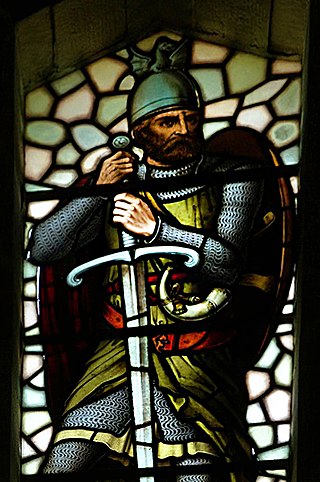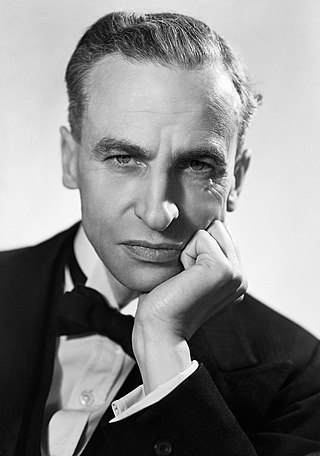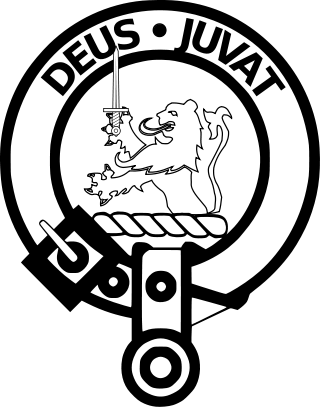
Sir William Wallace was a Scottish knight who became one of the main leaders during the First War of Scottish Independence.

Clan Campbell is a Highland Scottish clan, historically one of the largest and most powerful of the Highland clans. The Clan Campbell lands are in Argyll and within their lands lies Ben Cruachan. The chief of the clan became Earl of Argyll and later Duke of Argyll.

Clan Robertson, also known as Clan Donnachaidh, Clan Donnachie, and Clan Duncan is a Scottish clan.

Archibald Henry Macdonald Sinclair, 1st Viscount Thurso,, known as Sir Archibald Sinclair between 1912 and 1952, and often as Archie Sinclair, was a British politician and leader of the Liberal Party.

Tartan Day is celebration of Scottish heritage and the cultural contributions of Scottish and Scottish-diaspora figures of history. The name refers to tartan, a patterned woollen cloth associated with Scotland. The event originated in Nova Scotia, Canada, in 1987. It spread to other communities of the Scottish diaspora and Scotland itself in the 1990s to 2000s.

William McIlvanney was a Scottish novelist, short story writer, and poet. He was known as Gus by friends and acquaintances. McIlvanney was a champion of gritty yet poetic literature; his works Laidlaw, The Papers of Tony Veitch, and Walking Wounded are all known for their portrayal of Glasgow in the 1970s. He is regarded as "the father of Tartan Noir" and as Scotland's Camus.

John Howie was a Scottish biographer. His best known work was Biographia Scoticana, first published in 1775, which is often called The Scots Worthies. It deals with Christians and particularly Presbyterians especially in their strivings with church and civil authorities.

Clan MacDuff or Clan Duff is a Lowland Scottish clan. The clan does not currently have a chief and is therefore considered an Armigerous clan, which is registered with the Lyon Court. The early chiefs of Clan MacDuff were the original Earls of Fife, although this title went to the Stewarts of Albany in the late fourteenth century. The title returned to the MacDuff chief when William Duff was made Earl Fife in 1759. His descendant Alexander Duff was made Duke of Fife in 1889.

Clan Macpherson is a Highland Scottish clan and a member of the Chattan Confederation.

Andrew Douglas Alexander Thomas Bruce, 11th Earl of Elgin and 15th Earl of Kincardine,, styled Lord Bruce before 1968, is a Scottish peer and Chief of Clan Bruce.
Scottish Americans or Scots Americans are Americans whose ancestry originates wholly or partly in Scotland. Scottish Americans are closely related to Scotch-Irish Americans, descendants of Ulster Scots, and communities emphasize and celebrate a common heritage. The majority of Scotch-Irish Americans originally came from Lowland Scotland and Northern England before migrating to the province of Ulster in Ireland and thence, beginning about five generations later, to North America in large numbers during the eighteenth century. Today, the number of Scottish Americans is believed to be around 25 million, and celebrations of 'Scottishness' can be seen through major Tartan Day parades and Burns Night celebrations.

The history of the Jews in Scotland goes back to at least the 17th century. It is not known when Jews first arrived in Scotland, with the earliest concrete historical references to a Jewish presence in Scotland being from the late 17th century. Most Scottish Jews today are of Ashkenazi background who mainly settled in Edinburgh, then in Glasgow in the mid 19th century. In 2013 the Edinburgh Jewish Studies Network curated an online exhibition based on archival holdings and maps in the National Library of Scotland exploring the influence of the community on the city.

Alick Isaacs FRS was a Scottish virologist.
The personal name Duncan can be found in Scotland’s oldest records in its Gaelic form Dunchad/Donchadh/Donachie/Donnchadh and other spelling variants.

Clan Lamont is a Highland Scottish clan. The clan is said to descend from Ánrothán Ua Néill, an Irish prince of the O'Neill dynasty, and through him Niall Noigíallach, High King of Ireland. Clan Ewen of Otter, Clan MacNeil of Barra, Clan Lachlan, and Clan Sweeney are also descendants of Ánrothán. Traditional genealogy would therefore include Clan Lamont among the descendants of Conn Cétchathach.

Clan Logan is a very ancient Scottish clan of celtic origin. Two distinct branches of Clan Logan exist: the Highland branch; and the Lowland branch. The clan does not have a chief recognised by Lord Lyon King of Arms, and therefore can be considered an armigerous clan.
The Saint Andrew's Society of the State of New York is the oldest charitable institution in the state of New York and is focused on helping Scots in the New York community.

George Scot or Scott of Pitlochie, Fife was a Scottish writer on colonisation in North America.
Events from the year 1789 in Scotland.

Rev Archibald Riddell (1635–1708) was a Scots-born 17th-century Presbyterian church minister in Scotland and America. His name is sometimes spelled Riddel. He preached at conventicles in a time when such actions were considered high treason. He was imprisoned on the Bass Rock and was later banished to New Jersey.
















